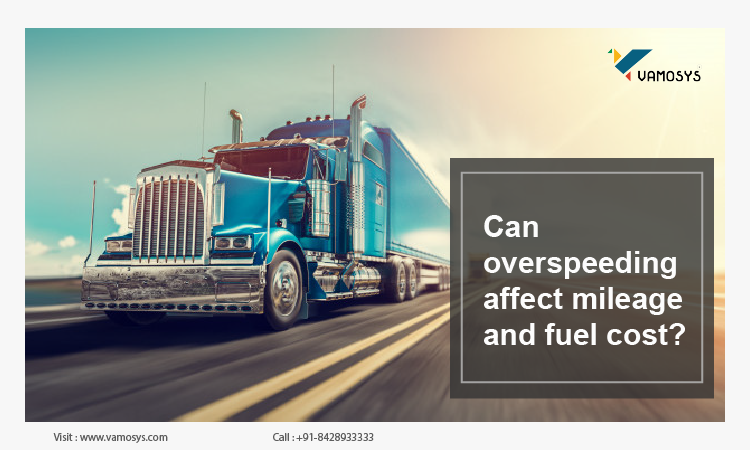Can overspeeding affect mileage and fuel cost?
Summary
The blog discusses how overspeeding can affect the mileage and fuel cost of a vehicle, which in turn can impact the cost-effectiveness of fleet management. It explains the impacts of overspeeding, such as increased fuel consumption, decreased mileage, accidents, and legal actions. The blog suggests that being economical is essential for the logistics industry and recommends using GPS tracking devices and telematics solutions to monitor fuel consumption and reduce costs.
Being economical is a basic necessity of any transportation. Logistics is completely dependent on its fleets and its performances to be cost effective. Most important aspect of being cost effective is to be economical. Overspeeding is a major drawback for fleet management as it affects the mileage leading to inefficiency of fuel usage and increases the fuel expenses of a company.
How to be economical?, in this blog you will see the effects of overspeeding and how it affects the mileage and fuel cost.

Speeding
Speed is the measure of distance travelled by an object in a given time. Speeding generally happens when the travel time has to be reduced. Time is a key factor that decides the speed and an act of overspeeding. In this fast moving world, any business runs with respect to time as professionals are very much sensitive to time.
Apart from being time sensitive, there is another major reason for overspeeding called ‘Thrill’. Speed thrills an individual but it also affects various aspects of one’s life and the business involved. Further lets see the impact of overspeeding in the field of transportation.
Impacts of overspeeding
Overspeeding of vehicles can be disastrous for any company in the logistics industry. First it can lead to lack of control over the vehicle due to overspeeding which would result in unexpected collisions.
Such collisions can be disastrous during the fleet operations as it causes heavy damage for the fleet and the movement gets struck completely. Hence, it increases the waiting time of the client and affects the flow of trade.
Accidents due to overspeeding might also lead to legal actions against the company and the driver for overspeeding beyond the speed limits. Transport authority has its own laws of speed limits based on various categories like national highways, state highways, urban roads, etc.
Another major and most significant impact of overspeeding is on fuel efficiency. Overspeeding causes additional usage of fuel as it takes more combustion of the fuel to travel faster in a shorter time. Such uneconomical activity is called overspeeding.
In this scenario of alarming fuel costs, the transportation industry has become prey for the continuous rise in fuel costs. In such cases, overspeeding is definitely a curse and it is suicidal for the fleet management.
Overspeeding of the fleets will result in an increase of fuel usage. Traveling over longer distances will create a huge impact on the fuel budget. Overspeeding can never help a management to be cost effective for its company’s bottom line growth.
How does it affect Mileage and Fuel Cost?
Mileage is the measure of the number of miles travelled by the vehicle per litre of fuel. Mileage of a vehicle is based on various factors like speed of the vehicle, condition of the vehicle, driver behavior.
Higher the speed of the vehicle, higher will be the consumption of fuel. More fuel is consumed for the combustion process to move the pistons at higher speed that makes the crankshaft move faster and ultimately speeds up the rotation per minute (rpm) of the wheels that makes the vehicle move faster.
Every vehicle has its range of speed that is economical. What is it being economical? Being economical is about using nothing more than what is necessary or in other words, being economical gives good returns when compared to its investment.
So, a good vehicle is defined by its mileage. If the best mileage performance of a vehicle is 20km/litre. Then it has its own speed limit to achieve that particular mileage.
Overspeeding will increase the fuel usage and decrease the mileage of vehicle per litre which is not cost effective for the fleet management.
Being cost effective is very much important for the logistics industry. Industry involves trades of longer distances which needs a highly responsible team of execution to be cost effective.
A responsible driver can never overspeed. Drivers must be alerted, encouraged to be as economical as possible for the betterment of the company.
Fuel efficiency of the fleets is a key factor as it can reduce the expenses on fuel at a larger scale. Whereas overspeeding will result in huge fuel expenses and it can affect the bottom line growth of a company.
EXAMPLE:
If the mileage of a vehicle is 10km per litre. Then the vehicle has its own level of economical fuel consumption at a specific speed. Generally for trucks, the economical speed is around 50 – 60 km/hr. And the efficiency decreases if the speed of the vehicle goes beyond 60km/hr, which means the fuel consumption is high at higher speed and the mileage drops per litre of fuel.
On average, a truck can travel for 400 km a day at the speed of 50km/hr, which takes 8hours of travel. In case of overspeeding, the same distance of 400km can be travelled at a higher speed of 100km/hr which will take only 4 hours of travel.
But the fuel consumption will be much higher since the vehicle has to be refueled twice the time than what is actually required for the truck to travel 400km, which is not economical for the company. Such conditions are caused by overspeeding making it highly expensive for the management to handle fuel costs.
Here is the solution - GPS tracking devices and Telematics solution
Rate of fuel consumption and the cost of fuel being the biggest concern for the logistics, the technology has made it possible for a better platform to keep things under control by fuel monitoring through GPS tracking system.
Vamosys Telematics provides various solutions like GPS trackers, fuel sensors that can be connected to the vehicle which sends the signals to cloud servers which makes it easy for the management to have an eye on the exact live location of the vehicle through a user friendly mobile app.
Such GPS trackers of Telematics also have highly sensitive chips that can monitor the fuel levels in the tanks, you can have a complete history of fuel usage, re-fueling and avoid fuel theft by instant alarm and engine lock systems too with just a swipe of your finger.
Through continuous monitoring of the vehicle movement and its fuel consumption levels, various other factors can also be avoided like vehicle idling, mis-directions etc which can reduce the unwanted usage of fuel.
These solutions are a big boon for the companies to have a complete control over their investment and ensure that the execution is cost effective and profitable for the company.
Sushanthi
Sushanthi is a Content Writer who wishes to be the voice of brands to project their innovative ideas and stories through her writing skills.

